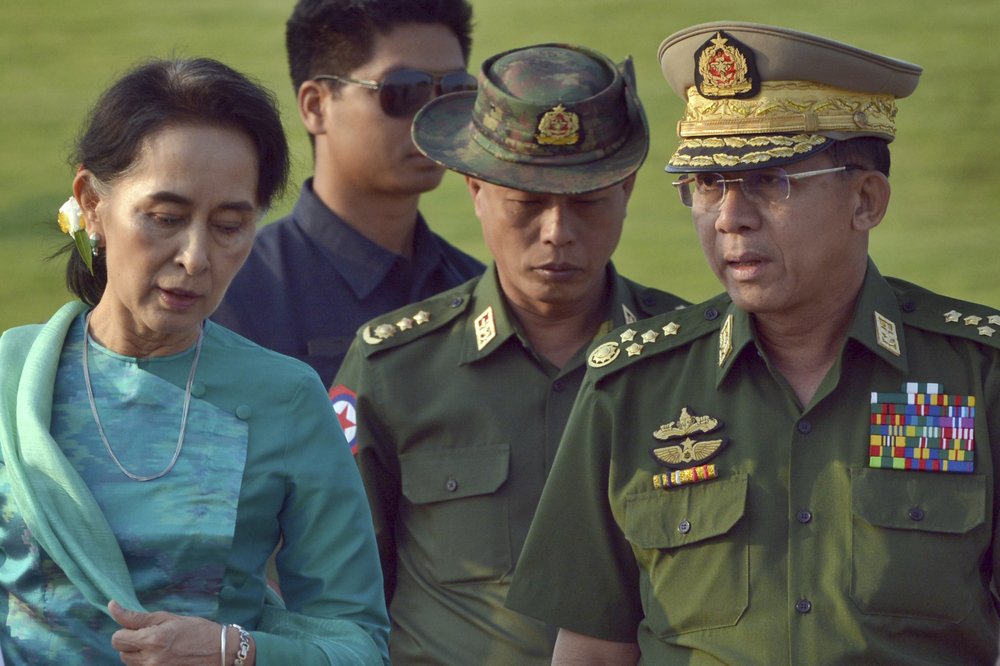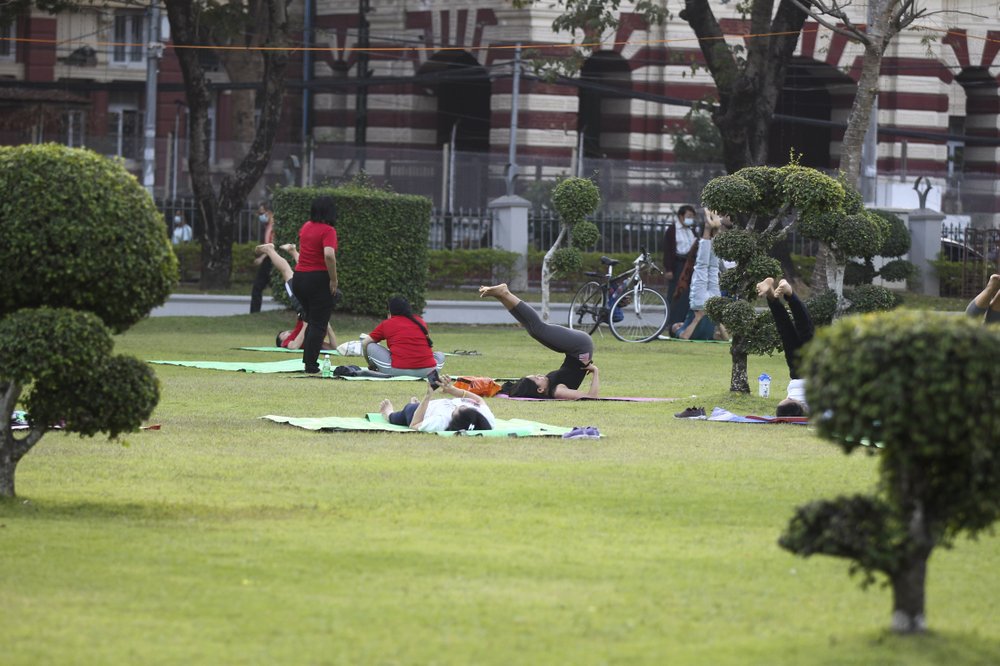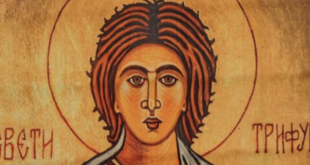
BOOM!
AP:
Myanmar military television said Monday that the military was taking control of the country for one year, while reports said many of the country’s senior politicians including Aung San Suu Kyi had been detained.
An announcement read on military-owned Myawaddy TV cited a section of the military-drafted constitution that allows the military to take control in times of national emergency. It said the reason for takeover was in part due to the government’s failure to act on the military’s claims of voter fraud in last November’s election and its failure to postpone the election because of the coronavirus crisis.
The announcement and the declaration of a state of emergency follows days of concern about the threat of a military coup — and military denials that it would stage one — and came on the morning the country’s new Parliament session was to begin.
…
Suu Kyi’s National League for Democracy released a statement on one of its Facebook pages saying the military’s actions were unjustified and went against the constitution and the will of voters. The statement urged people to oppose Monday’s “coup” and any return to “military dictatorship.”
It was not possible to confirm who posted the message as NLD members were not answering phone calls.
The military’s actions were already receiving international condemnation.
U.S. Secretary of State Anthony Blinken issued a statement expressing “grave concern and alarm” over the reported detentions.
“We call on Burmese military leaders to release all government officials and civil society leaders and respect the will of the people of Burma as expressed in democratic elections,” he wrote, using Myanmar’s former name.
The office of the U.N. secretary-general was also among those to issue a statement condemning the developments as a “serious blow to democratic reforms.”
The detention of the politicians and cuts in television signals and communication services on Monday were the first signs that plans to seize power were in motion. Phone and internet access to Naypyitaw was lost and Suu Kyi’s party could not be reached. Phone service in other parts of the country was also reported down, though people were still able to use the internet in many areas.
The Irrawaddy, an established online news service, reported that Suu Kyi, who as state counsellor is the nation’s top leader, and the country’s president, Win Myint, were both detained in the pre-dawn hours. It cited Myo Nyunt, a spokesman for the NLD.
The report said that the party’s Central Executive Committee members, lawmakers and regional Cabinet members had also been taken into custody.
A list of other people believed to have been detained, compiled by political activists, included filmmaker Min Htin Ko Ko Gyi, writer Maung Thar Cho, and prominent veterans of the country’s 1988 student protest movement, such as Ko Ko Gyi and Min Ko Naing. Their detention could not immediately be confirmed.
The military TV report said Commander-in-Chief Senior Gen. Min Aung Hlaing would be in charge of the country, while Vice President Myint Swe would be elevated to acting president. Myint Swe is a former general best known for leading a brutal crackdown on Buddhist monks in 2007. He is a close ally of former junta leader Than Shwe.
In a later announcement, the military said an election would be held in a year and the military would hand power over to the winner.
As word of the military’s actions spread in Yangon, the country’s biggest city, there was a growing sense of unease among residents who earlier in the day had still been packed into cafes for breakfast and had been doing their morning shopping.
People were removing the bright red flags of Suu Kyi’s party that once adorned their homes and businesses. Lines formed at ATMs as people waited to take out cash, efforts that were being complicated by internet disruptions. Workers at some businesses decided to go home.
The military maintains its actions are legally justified, though Suu Kyi’s party spokesman as well as many international observers have said it is in effect a coup.
The 2008 constitution, implemented during military rule, has a clause that says in cases of national emergency, the president in coordination with the military-dominated National Defense and Security Council can issue an emergency decree to hand over the government’s executive, legislative and judicial powers to the military commander-in-chief.
..
It is just one of many parts of the charter that ensured the military could maintain ultimate control over the country at the expense elected politicians. The military also was guaranteed 25% of seats in Parliament and control of several key ministries, especially those involved in security and defense.
The 75-year-old Suu Kyi is by far the country’s most popular politician, and became the country’s de facto leader after her party won 2015 elections, though the constitution barred her from being president. She had been a fierce antagonist of the army during her time under house arrest.
Nevertheless, once in power Suu Kyi had to balance her relationship with the country’s generals and even went on the international stage to defend their crackdown on Rohingya Muslims in the country’s west, a campaign the U.S. and others have labeled genocide. That has left her reputation internationally in tatters.
She remains wildly popular at home, where most supported the campaign against the Rohingya. Suu Kyi’s party captured 396 out of 476 seats in the combined lower and upper houses of Parliament in November’s polls.
The military has charged that there was massive voting fraud in the election, though it has failed to provide proof.
HA!
Honestly, I’m a registered Asian expert and confirmed gook-lover, but I don’t fully know the ins and outs of Myanmar.
I know the basic story, a lot better than most do I’m sure, but I’m not going to get up here and claim to be an expert on something that I’m not an expert in. That said, no one is really an expert in this topic. It’s too esoteric, and too opaque.
Basically, Asians are not very confrontation inclined, whilst being extremely patriarchy inclined, so the military peacefully takes over countries on a usual basis. Because all a “coup” entails is the military walking into the democracy office and telling them it’s time to wrap it up.
This is what was happening outside the government plaza when the coup took place this morning:
Obviously, the West has been trying to force this democracy system on everyone, but Asians just don’t care. The only successful democracy in Southeast Asia is the Philippines, which is also the poorest and has the highest crime rate (both those things by a lot).
Basically, the military was still running Burma, and this whole democracy thing was a farce. As you can read above, the Constitution says the military had a right to take over the country at any time. Daw Suu was out there doing her bit as the Western-backed democracy figure – and pulling in the Western aid dollars – then the military decided to run all the Moslems out of the country, back to Bangladesh.
So, Suu had to get up there and defend the actions of the military, and then the entire West denounced her as an evil fascist dictator, and a bunch of aid programs were cut. If there were no aid programs, then there was not a reason to put on this show of a democracy. That’s my guess. No one actually knows. Even the people of the country don’t know, as the above AP quote states.
Hopefully, this isn’t some kind of Western trick. I doubt it is. It’s more like the opposite.
One thing people have to understand about these people is that whatever you want to say about them, they still have a spine, they still have self-respect. But, with all of this stuff going on in the world, you have to wonder. Possibly, Suu was trying to negotiate something with the West behind the back of the military. Maybe China is involved. Who knows.
It definitely probably relates to Fake President Joe Biden’s aggressive moves against them, accusing them of “genocide” yet again, but that is after a long line of insults and aid cuts going all the way back to 2017.
But I would say the basic explanation is just simple: without the aid dollars, there was no reason to be putting on this show, and with instability in the region (State Department Thailand protests trying to overthrow the king), they decided it was time to wrap it up.
What we can take away from this is that democracy is a failed system, and countries where people still have self-respect understand that.
 Daily Stormer The Most Censored Publication in History
Daily Stormer The Most Censored Publication in History




